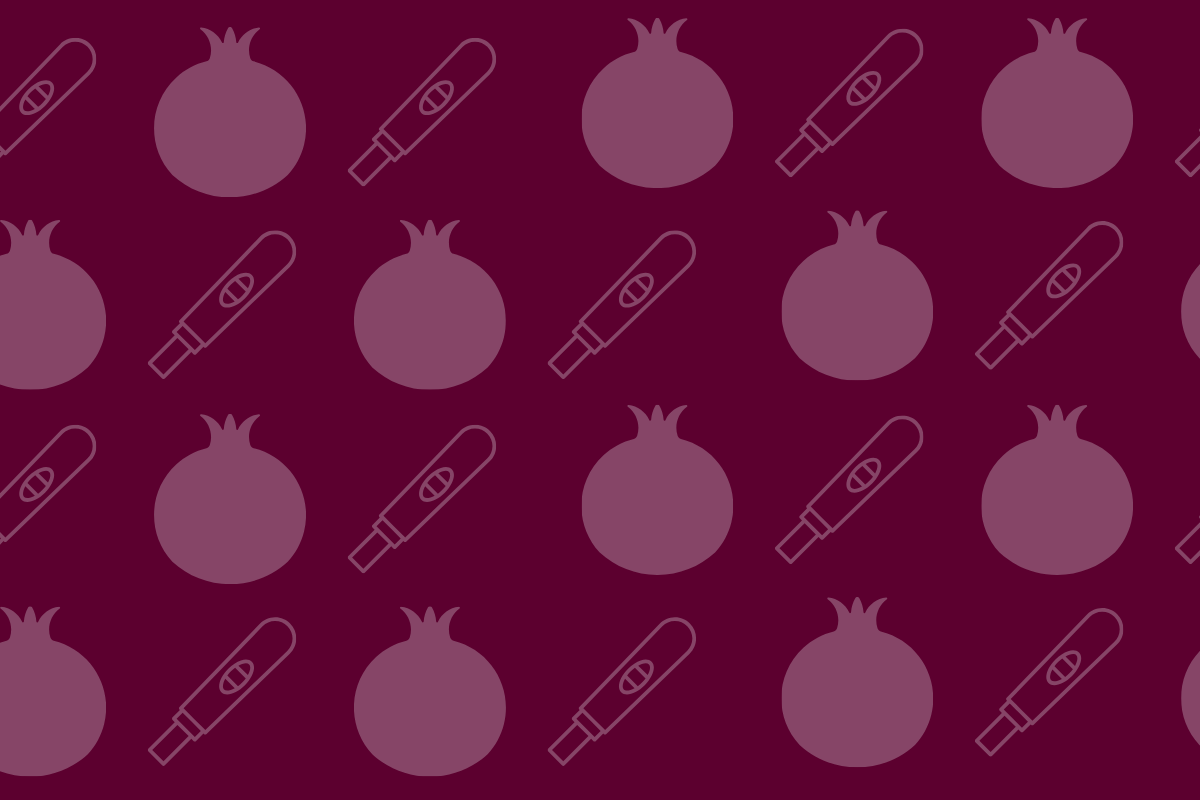On a recent Shabbat afternoon, my husband, Alex, and I took our newborn for a walk in Riverside Park near our apartment in upper Manhattan. The day was warm and the river sparkled in the sunlight; the perfect New York afternoon. As we walked on the tree-lined path north of 110th Street, Alex looked at me with the expression of someone who just experienced a profound revelation.
“The last time we walked here…” His voice trailed off as he took it in.
“I know,” I said.
The last time we walked on that path was last Rosh Hashanah. The first day of Rosh Hashanah was exactly nine days after my first embryo transfer, which meant that it was the day we would find out if the transfer was successful, if I was pregnant. So that morning I did something I’d never done on Rosh Hashanah: I got on the subway. I took the 1 Train down to the fertility clinic, and after a quick blood draw was on my way home, then off to work for one of my favorite days of the year as a rabbi on campus. My fertility doctor would call early in the afternoon with the result.
I was looking forward to Rosh Hashanah not only because I would find out if our IVF process had been successful, but because the Torah and Haftarah readings that day spoke to me in a way they never had before. The deep beauty of the High Holy Day readings is that they invite us to reflect on who we are at this specific moment in our lives and in the world as we engage with the same stories of our ancestors. Year after year, the stories and the words we read are the same, but we are not.
This year, my connection felt literal: The traditional readings on the first day of Rosh Hashanah are about Sarah and Hannah, who, like me, had trouble conceiving a child. Remarkably, on one of the holiest days of the year, the rabbis chose stories for us to read that highlight the voices and experiences of women through one of the most challenging and miraculous times of their lives. So I prayed that like Sarah and Hannah, I too would be blessed with a child this year.
Shortly after the Musaf Amidah began, Alex nudged me with excitement as his watch silently signaled that he was getting a call from the fertility clinic. We crept out of the service and ducked into an empty classroom to take the call. We looked at each other hopefully as Alex pressed the phone to his ear.
His face sank. “Thank you for letting us know,” he said.
Our embryo transfer was unsuccessful. We sat on the floor and wept. We resolved to try, again. I felt like my body failed me, again.
The classroom was dark but the sunshine poked through the blinds. We rose from our own form of mourning and walked down the block to Riverside Park. The day was warm and the river sparkled in the sunlight; the perfect New York afternoon.
We held hands walking on the tree-lined path north of 110th Street. Even in the crowded park with kids playing and people running with their dogs, it was as if we were in our own little bubble. Weeks of injections, months of praying and struggling, and this was the result.
Surprisingly, more than sadness, the feeling that overcame me on that walk was hope. Sarah, whose body was well beyond the ability to get pregnant and give birth, gave me hope. Hannah, who expressed herself with her entire being, gave me hope.
“Do you want to wait before attempting another transfer?” Alex asked.
“No, I’m ready,” I replied, the words themselves attempting to convince me that I actually was.
That evening, before hosting a festive Rosh Hashanah dinner for over 100 students on campus, I went into my office to gather myself. I closed the door, lowered the blinds and sat in my desk chair with my face in my hands. Tears began to roll, then flow down my cheeks and onto my dress.
Someone from the maintenance staff walked into my office to clean up, expecting to find the room empty. She saw me and ran over, put her arms around me and said, “It’s going to be OK.” She had no idea why I was crying nor did she ask, but she kept her arms around me. “It’s going to be OK.”
Before the meal was served, I thought about Sarah and Hannah as I led our community in kiddush, sanctifying this holy day. Holy in its intensity, holy in its promise, holy in its hope for the year ahead.
On that first day of the month of Tishrei we got the call that we had feared. Then on the last day of Tishrei came the call that we had longed for. The next transfer was successful. A well of joy and relief overcame me, along with a sense of wholeness that I had not yet experienced. A new kind of life, a new kind of hope, in a new year.
And now, one year later as I head into my first Rosh Hashanah as a mom, I am still clinging to Sarah and Hannah, eager to privately hear myself in their stories read publicly once again. Just as these women held me only one year ago, just as I hold my baby today, I also want to hold the journey of hope that brought him here, sustained me and allowed me to reach this moment.








